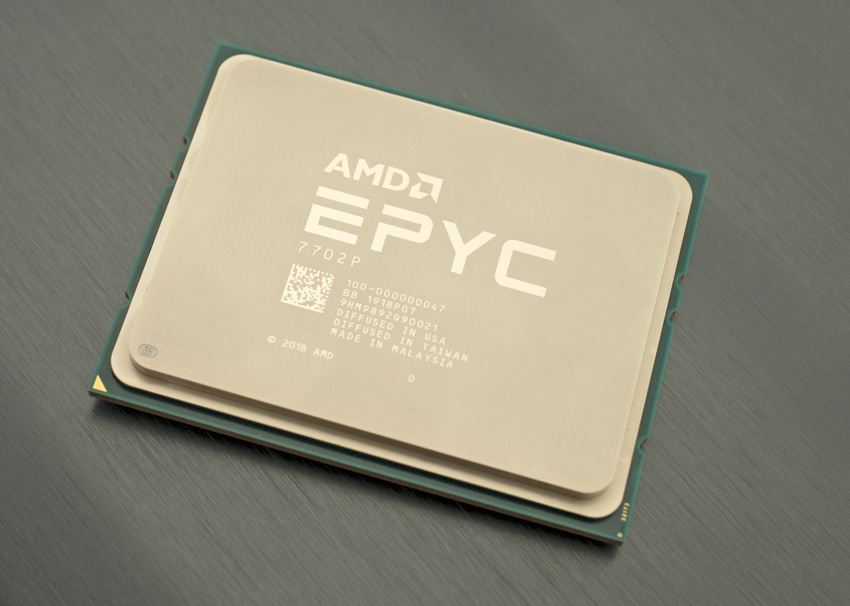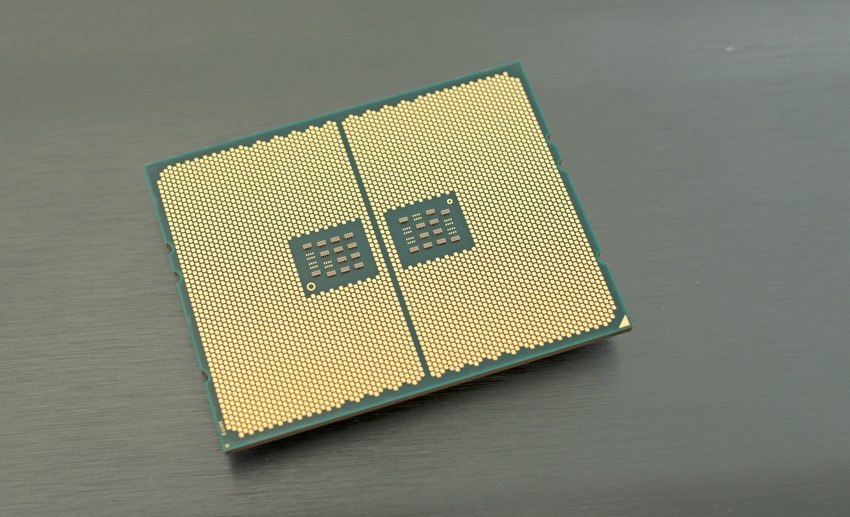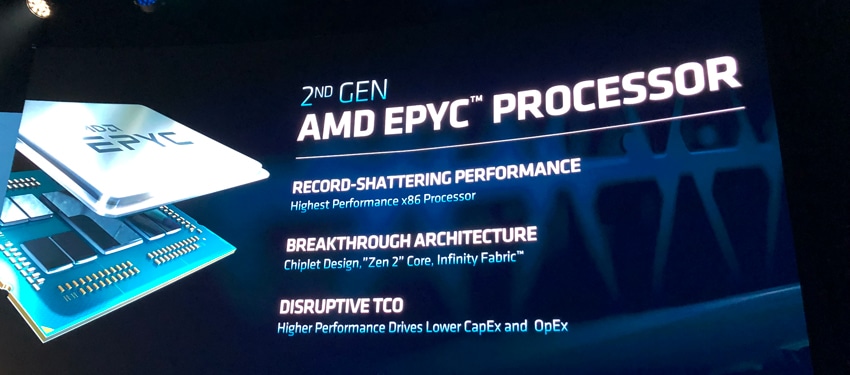Today at a launch event in San Francisco, AMD announced the launch of its second generation EPYC Processors, EPYC Rome 7002 series. The new CPUs are 7nm and have up to 64 “Zen 2” cores, 128 threads and leverage PCIe Gen4, making them the first x86 server processor to do so. Along with greater performance, the AMD EPYC Rome 7002 processors come with silicon embedded protection for added security.

About two years ago, AMD unleashed its EPYC 7000 series of processors. EPYC entered a field that was largely dominated by Intel up until that point. The draw of the EPYC processors were higher performance at a lower cost. EPYC single socket performance is where it really gained attention and notability, not only delivering performance but lowering TCO with issues such as per socket licensing. Since its release, and with support from just about every major vendor, the EPYC processor has really proven itself. We’ve had a chance to review it ourselves as well in a Dell EMC PowerEdge R7415 Server and Tyan Transport SX TN70A-B8026 Server. In the meantime, Intel has released the second generation of its Xeon Scalable processors, upping the ante for AMD to do likewise. And today they have.

The architecture of the second-generation AMD EPYC is all about performance. It is the world’s first high-performance x86 7nm server CPU. AMD has claimed to improve the CPU core execution engine over the original “Zen” core. Additionally EPYC Rome has twice the density, 1.25x the frequency (at the same power), and uses half the power (at the same performance of the previous model). AMD goes on to state that there is more on-chip bandwidth in all compute modes. The new CPUs also have high memory speed and bandwidth with a maximum theoretical memory bandwidth of 410GB/s (45% higher than Intel Xeon 2nd gen Scalable CPUs).
The AMD EPYC Rome 7002 Series includes:
| Model No. | Default TDP (W) | cTDP Min (W) | cTDPMax (W) | Cores | Threads | Base Freq (Ghz) | Max. Boost Freq (Ghz) | L3 $ (MB) | DDR Channels | Max DDR Freq (1DPC) | PCIe |
| 2P Product Stack | |||||||||||
| 7742 | 225 | 225 | 240 | 64 | 128 | 2.25 | 3.4 | 256 | 8 | 3200 | x128 |
| 7702 | 200 | 165 | 200 | 64 | 128 | 2.0 | 3.35 | 256 | 8 | 3200 | x128 |
| 7642 | 225 | 225 | 240 | 48 | 96 | 2.3 | 3.3 | 256 | 8 | 3200 | x128 |
| 7552 | 200 | 165 | 200 | 48 | 96 | 2.2 | 3.3 | 192 | 8 | 3200 | x128 |
| 7542 | 225 | 225 | 240 | 32 | 64 | 2.9 | 3.4 | 128 | 8 | 3200 | x128 |
| 7502 | 180 | 165 | 200 | 32 | 64 | 2.5 | 3.35 | 128 | 8 | 3200 | x128 |
| 7452 | 155 | 155 | 180 | 32 | 64 | 2.35 | 3.35 | 128 | 8 | 3200 | x128 |
| 7402 | 180 | 165 | 200 | 24 | 48 | 2.8 | 3.35 | 128 | 8 | 3200 | x128 |
| 7352 | 155 | 155 | 180 | 24 | 48 | 2.3 | 3.2 | 128 | 8 | 3200 | x128 |
| 7302 | 155 | 155 | 180 | 16 | 32 | 3.0 | 3.3 | 128 | 8 | 3200 | x128 |
| 7282 | 120 | 120 | 150 | 16 | 32 | 2.8 | 3.2 | 64 | 8 | 3200 | x128 |
| 7272 | 120 | 120 | 150 | 12 | 24 | 2.9 | 3.2 | 64 | 8 | 3200 | x128 |
| 7262 | 155 | 155 | 180 | 8 | 16 | 3.2 | 3.4 | 128 | 8 | 3200 | x128 |
| 7252 | 120 | 120 | 150 | 8 | 16 | 3.1 | 3.2 | 64 | 8 | 3200 | x128 |
| 1P Product Stack | |||||||||||
| 7702P | 200 | 165 | 200 | 64 | 128 | 2.00 | 3.35 | 256 | 8 | 3200 | x128 |
| 7502P | 180 | 165 | 200 | 32 | 64 | 2.50 | 3.35 | 128 | 8 | 3200 | x128 |
| 7402P | 180 | 165 | 200 | 24 | 48 | 2.80 | 3.35 | 128 | 8 | 3200 | x128 |
| 7302P | 155 | 155 | 180 | 16 | 32 | 3.00 | 3.3 | 128 | 8 | 3200 | x128 |
| 7232P | 120 | 120 | 150 | 8 | 16 | 3.1 | 3.2 | 32 | 8 | 3200 | x128 |
Part of this release that can be a game changer is the fact that the new AMD EPYC Rome 7002 processors are the first PCIe Gen4 ready x86 server CPUs. The first aspect of this is that right off the bat it doubles the bandwidth/channel. This will dramatically improve NVMe SSD performance, both in requiring fewer channels to get the same job done, which helps chassis and motherboard vendors cram additional functionality in that was previously used all by storage devices. We saw the tradeoff of the limitation inside a Tyan server last year, which allocated so much to storage components that it only left a single x8 PCIe slot for a network card. Something else to consider here, as workloads evolve FPGAs and GPUs went from being beneficial to necessary. Now the latest versions won’t be bandwidth hindered as more servers come to market supporting PCIe Gen4.

Finally, AMD has boosted the security of the processor. The EPYC 7002 series has hardware root of trust as its foundation of security, along with hardware validated boot. The CPUs have AES-128 encryption in the memory controller, secure memory encryption, and secure encrypted virtualization.
Vendor Support
Several vendors have announced support for the new CPUs with most of the rest to come in the following days. Vendors that have announced so far include:
- Dell EMC: Dell Technologies stated it will offer a complete portfolio of Dell EMC PowerEdge servers with 2nd Generation AMD EPYC processors. The company has not yet given a time frame. *Update* Dell has announced several new PowerEdge Servers based on the new EPYC CPUs.
- HPE: HPE is not only supporting the new CPUs, they have announced that they have broken several world performance records leveraging the new processors.
- GIGABYTE: GIGABYTE has launched an entire series of servers that support the EPYC Rome servers and our review can be found here.
- Lenovo: Lenovo released two new servers running the new AMD EPYC Rome CPUs.
- TYAN: TYAN has released two new platforms that support the AMD EPYC 7002: the 2U single-socket Transport SX TS65-B8036 server and the single-socket Tomcat SX S8036 server motherboard.
- Super Micro Computer: Supermicro has launched a new line, the H12 A+ server family, that support the new EPYC CPUs as well as using the servers and processors to set world records of their own.
- Samsung: Samsung has launched the PM1733 SSD and new DRAM that supports the AMD EPYC 7002 CPUs.




 Amazon
Amazon